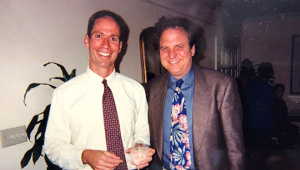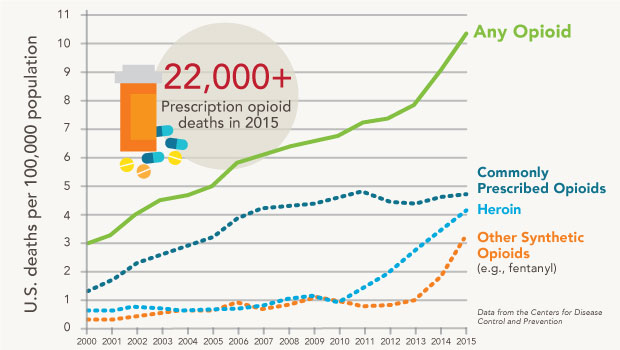Celebrating Dr. Michael Von Korff’s 36 years of research to improve care for depression and chronic pain

Discovering better ways to care for people who are depressed or have chronic pain, one of KPWHRI’s founding scientists has helped change health care around the globe.
If you come to the seminar honoring Dr. Michael Von Korff’s retirement from Kaiser Permanente Washington Health Research Institute (KPWHRI) on April 23, you’re likely to hear a recurrent theme. “Michael’s work is about the big picture,” his colleagues say. “He’s a systems thinker.” “He has helped us understand how all of our efforts work together to serve patients in everyday care.”
That wide view is integral to Dr. Von Korff’s research—finding better ways to manage disorders that affect the central nervous system, emotions, and behavior, including problems such as depression and chronic pain. The frequent occurrence and devastating effects of these conditions attracted him to study these conditions in first place.
“I saw that a large part of human suffering and disability is caused by these disorders,” he says.
He also saw a health care system designed to handle acute conditions, but not chronic illness. The intellectual challenge of transforming care to better serve patients has kept him engaged for decades.
“People with chronic pain or depressive illness—or both—typically seek health care when they have an exacerbation, when their problem is at its worst,” he explains. They often improve—at least for a while—regardless of the treatment. That’s just the nature of such conditions.
“So it can be difficult to learn through experience what actually works,” he says. “The physician and the patient believe that whatever was done was helpful because the condition improved. But too often the long-term outcomes are insufficient to restore a high quality of life.”
There are better ways—approaches that Dr. Von Korff and colleagues developed and refined through decades of rigorous randomized trials. Much of his work on depression was done in collaboration with Elizabeth Lin, MD, MPH, a Kaiser Permanente Washington family physician and affiliate investigator at KPWHRI, and the late Wayne Katon, MD, of the University of Washington Department of Psychiatry.

Drs. Greg Simon and Michael Von Korff in 1998.
For both depression and chronic pain, engaging patients is key,” says Dr. Von Korff. “People need support to do things that are helpful—whether that’s taking the right medicines or re-engaging in life activities that help them feel and do better. Unfortunately, health care too often fails to support patients in carrying out treatments that help long-term, and in adapting treatments when patients are not improving.”
Dr. Von Korff and his collaborators focused much of their research on how health care teams care for patients. This work led to the development of “collaborative care” for treating depression in primary care. The approach involves a non-physician care manager supporting patients and structuring care. There’s also a role for consulting specialists such as psychiatrists to give guidance to the team when needed.
The team’s work on collaborative care for depression has been replicated by dozens of other researchers and has changed best-practice guidelines for depression in the United States and internationally. It has been widely disseminated, improving the lives of millions of people with common mental health problems. In addition, the Veterans Health Administration and other large health care organizations have recently adopted a stepped, collaborative care approach for chronic pain that was based in part on KPWHRI research.
Over the last decade, Dr. Von Korff has also focused on the problem of inappropriate opioid prescribing for chronic pain that has fueled our nation’s epidemic of opioid overdose and addiction. In 2010, he published the first study to link increased rates of fatal and nonfatal opioid overdoses to prescriptions of higher daily doses. He worked with clinical leaders at Kaiser Permanente Washington and other organizations such as Washington state’s Bree Collaborative on strategies to discourage such prescribing. He also co-founded Physicians for Responsible Opioid Prescribing, a national organization that has advocated for more cautious prescribing and for safer and more effective approaches to chronic pain care.
Says KPWHRI Senior Investigator Lynn DeBar, PhD, “He was one of the early voices that said, this has got to stop; the prescribing is out of control and we don’t have evidence to support it. People on these drugs are not functionally better and there are all these adverse effects.”
In addition, Dr. Von Korff evaluated opioid dose reduction efforts at Kaiser Permanente Washington, funded by the Patient-Centered Outcomes Research Institute. “Michael gave patients a voice in his research through an advisory group associated with that study,” says Dr. DeBar. “He is connecting us to people who are doing some of the most thoughtful advocacy and policy work around this issue.” At the same time, “he stays consistently focused on what the scientific evidence is telling us,” she adds.

An “instigator of Pub Night,” Michael Von Korff (far right) in 1995 with (left to right) Katie Saunders, Chester Pabiniak, Deborah Seger, Terry Bush, and Julia Hecht.
In 2015 and 2016, Dr. Von Korff worked with the National Institutes of Health to develop a comprehensive research agenda for helping people with chronic pain. He served as chair of the National Pain Strategy Population Research Work Group, which developed methods for defining and identifying “high-impact chronic pain”—an effort that has been applied in the U.S. National Health Interview Survey. This new approach helps health care systems and policymakers focus on the people with chronic pain who have the greatest needs.
“This work is now spreading across our field in ways that are super pragmatic,” explains Dr. DeBar, who also studies chronic pain at KPWHRI. “I credit Michael for his leadership in this area, because he knows how to bring researchers together around population health issues in ways that are clinically relevant.”
“One of Michael’s greatest strengths has been his ability to bring people together and get them energized to do things that are new and challenging,” says Greg Simon, MD, MPH, a KPWHRI senior investigator and Kaiser Permanente Washington psychiatrist who has collaborated with Dr. Von Korff. One example: a large, first-of-its-kind study with the World Health Organization focusing on how mental health care is delivered in general care settings worldwide.
“It was a huge and complicated undertaking that people thought could never happen,” Dr. Simon says. But thanks in part to Dr. Von Korff’s leadership, mental health researchers from over a dozen countries were engaged in a collaborative effort that systematically assessed the prevalence and treatment of common mental health problems in primary care settings around the world.
“Michael not only helped design the project,” Dr. Simon remembers. “He brought the social capital. He helped all these people get past their differences to focus on the larger mission. It’s that personal quality that’s been so important to the work we’ve been doing.”
Colleagues note that Dr. Von Korff brings similar attributes to his work within the Institute, where he served as associate director for external research during periods of great growth and change, from 1992 to 1996 and from 1999 to 2005. Some credit him with helping to set and maintain many of the Institute’s core values, particularly its emphasis on collaboration and teamwork.
Most however, may best remember him as an instigator of “Pub Night” and “the guy who threw the best parties.”
“I have seen enormous generosity,” says Dr. DeBar.
“He has great energy and incredible openness to experience.” adds Dr. Simon. “He’s been the one to make sure everybody gets credit, everybody is included.”
—by Joan DeClaire
opioid research

Stopping the opioid epidemic: Priority research at KPWHRI
Opioid misuse and overdose are now a national priority. For decades, KPWHRI has worked to help patients find safe, effective ways to manage chronic pain.
Learn more about our work in opioid research.
q&a with dr. von korff

Of big data, systems change, research partnerships
A conversation with KPWHRI’s Michael Von Korff, ScD, as he retires after 36 years of transformative health research
study of opioid use

Long-term opioid risks are the focus of $10 million KPWHRI study
Dr. Denise Boudreau launches a collaborative project with Kaiser and other health systems on the safety of long-term prescription opioid use.


